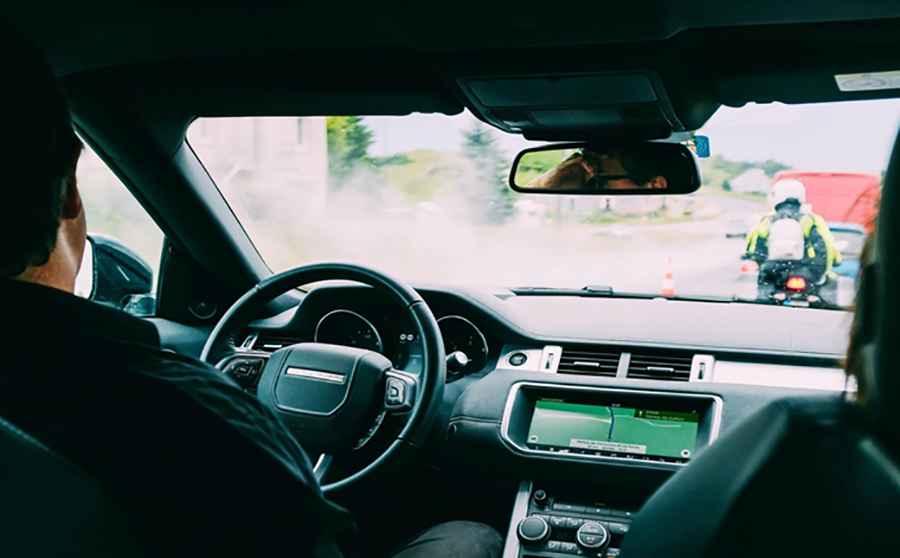What are the penalties for driving without insurance?
Except for New Hampshire and Virginia, most states require drivers to have some level of auto insurance. There is also a pretty heavy penalty for driving without insurance.

The minimum requirement is liability insurance, which signifies you as the driver were responsible for any damage that may have occurred in an accident.
Other types of coverage, such as comprehensive and collision coverage, aren’t always considered necessary, but it’s extremely beneficial to have since they’ll cover your vehicle in case of an accident.
The exact amount of coverage you should carry depends on where you live, as well as whether you own or lease your vehicle. If your car is leased, you are required to carry higher coverage levels compared to if you were to own it.
Financial Consequences of Driving Without Insurance
Similar to how each state requires different levels of insurance, they also each have their consequences on what happens after you are caught driving without insurance. In most cases, though, you are guaranteed to receive a fine.
The exact amount you’ll pay on fines varies by state. Maryland and Delaware are two states with the highest fines, even for just the first offense of driving without a license.
Maryland’s fines can be up to $2,500, and Delaware’s fines can be up to $3,500. The states with the lowest fines are Missouri and Tennessee, with fees up to $500 and $300, respectively.
Suspension of License and Registration
Most states will suspend your license and registration if you don’t have auto insurance. Without a valid license or registration, you can’t legally drive your vehicle or park it on public roads (even in front of your house) until the registration is reinstated.
However, if only your registration was suspended, you would be able to drive a vehicle that does have valid registration.
In some states, your license and registration are suspended for a certain amount of time. Massachusetts will suspend your license and registration for 60 days. In some states, you could face suspensions for an entire year.
Other states will suspend your license and registration until you can provide them with proof of insurance. In this case, your best option is to begin hunting for a policy as soon as possible.
You’ll probably have to pay a reinstatement fee if you want to validate your license and registration again.
Serving Potential Jail Time
In some states, you could face jail time even after your first time driving without insurance. In Kentucky, for example, you could face up to 90 days in prison after your first offense.
You are not guaranteed to face jail time if you are caught driving without insurance. In fact, in many states, you aren’t a risk of facing jail time until you have multiple offenses.
Naturally, the more times you are caught driving without insurance, the more jail time you will face with each offense. The same can be said about the amount you pay in fines.
Registering for SR-22
Some states require those without insurance to register for an SR-22 (known as FR-44 in Florida and Virginia). Drivers are ordered to acquire an SR-22 by a court or their state.
It’s considered to be a certificate of financial responsibility, and it is used to prove the driver has car insurance meeting the minimum coverage required by law.
Since it shows the driver now has an insurance policy, you’ll need to purchase insurance coverage if you were required to get an SR-22. Some insurance companies, like Progressive, will file an SR-22 for you.
Other scenarios where a driver is required to get an SR-22 is if they were convicted of a DUI or were involved in other reckless driving.
Vehicle Impoundment
A handful of states will impound your uninsured vehicle, including California, Connecticut, Nevada, and New York. Getting a car back from the impounding lot without car insurance is fairly difficult.
As you’d expect, you need proof of insurance to get a car out of the impound. Since your car was impounded due to a lack of insurance in this scenario, you’ll need to purchase a policy first.
Having an impounded vehicle shouldn’t impact your ability to purchase a car insurance policy. It’s still important that you purchase a policy that’s right for you and your needs, so even if you are on a time crunch, you should shop carefully.

What happens when an uninsured driver gets in a car accident?
Getting in a car accident when you don’t have car insurance can also have severe consequences.
Regardless of if you were at fault, you’ll have to pay for any damage caused to your vehicle out of pocket. Plus, you won’t receive any compensation in the case that you or a passenger are injured.
The basic liability insurance will only cover any damages that another person takes in an accident. It won’t cover anything that happens to you in an accident.
If you were at fault for a car accident and you don’t have insurance, you could be at risk of the other driver involved suing you if you don’t pay for their injuries and other damages.
If the other driver was at fault for a car accident, the laws of your state could limit how much compensation you receive.
For example, if you were to get in a car accident in a no-fault state, both parties involved will have to use their insurance coverage to pay for their damages. Not having insurance means paying for everything out of pocket, which can be extremely costly.
Even if you have no insurance, an attorney can still help you with the situation and possibly provide you with compensation. This is especially helpful in the case that your accident goes to court.
Purchasing a Car Insurance Policy
The most typical piece of advice given to those who will purchase a car insurance policy is to shop around. Different insurance companies can provide you with different discounts and quotes.
For example, you could benefit from bundling your home and auto insurance with companies that allow bundling.
Your driving history is a huge factor in insurance policies, so you should practice safe driving as often as you can. As your safe driving continues, you can often receive safe driving discounts from your provider.
Another way to ensure that your car insurance policy is affordable is to improve your credit.
Believe it or not, your credit score will impact the cost of your insurance policy. Granted, it isn’t the only factor, but a low credit score can give you high insurance costs.
Take the time to shop around, compare quotes, and talk to an insurance agent to find the right policy. In the end, the peace of mind will be worth it.
 | Luke Williams writes and researches for the car insurance site, CarInsuranceComparison.com. His passions include best practices for insurance and helping motorists get the best possible policies. |